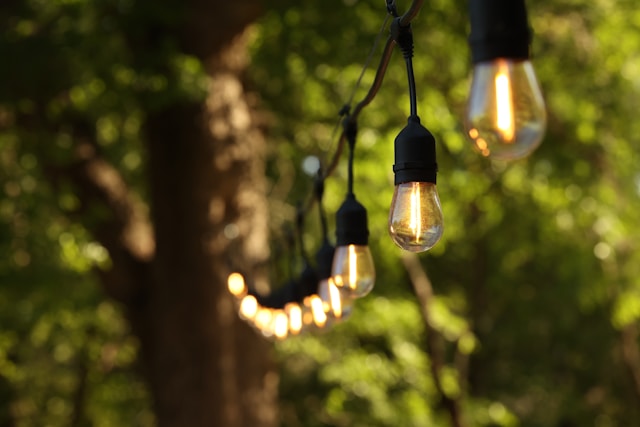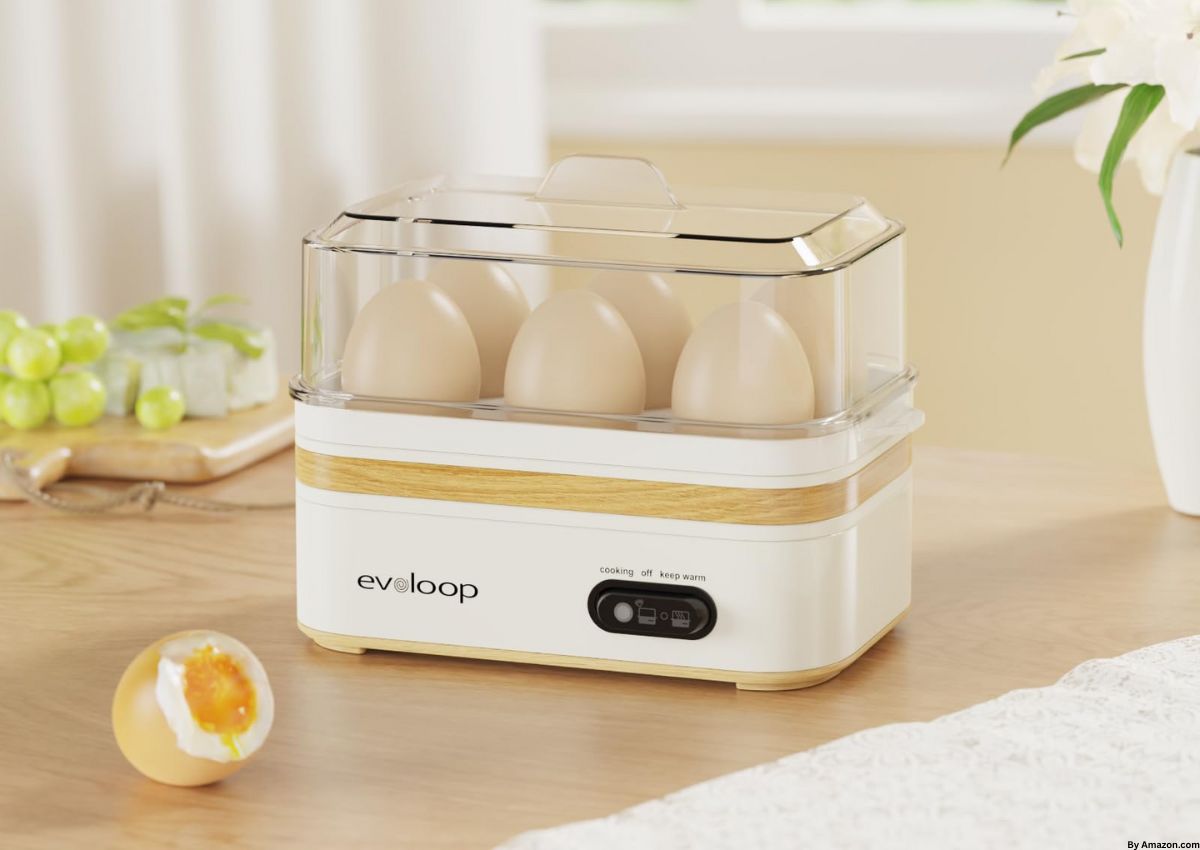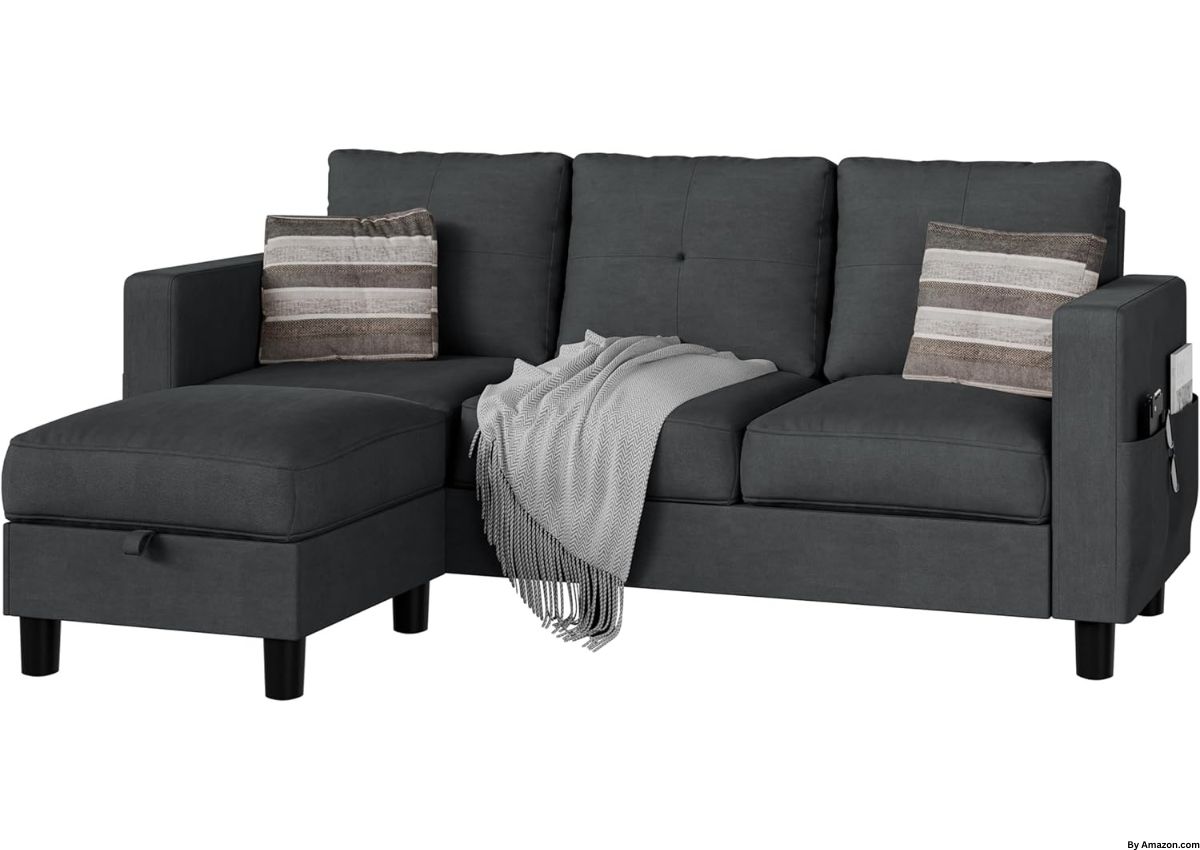Boiled egg makers have become one of the most practical kitchen appliances for busy households, students, and anyone who loves a quick, protein-packed meal.
From compact models perfect for small kitchens to larger stainless-steel units designed for families, egg cookers offer convenience and consistency.
In this guide, we’ll walk you through the best egg cookers available, how to use them correctly, common mistakes to avoid, and essential tips for extending their shelf life.
List
- Do You Need an Egg Cooker in Your Kitchen?
- Top 6 Egg Cookers You’ll Love
- How to Use Your Egg Cooker Properly and Keep It Lasting Longer
- Common Egg Cooker Mistakes and How to Fix Them
- Boiled Egg Maker FAQs: Everything You Need to Know
| Do You Need an Egg Cooker in Your Kitchen?
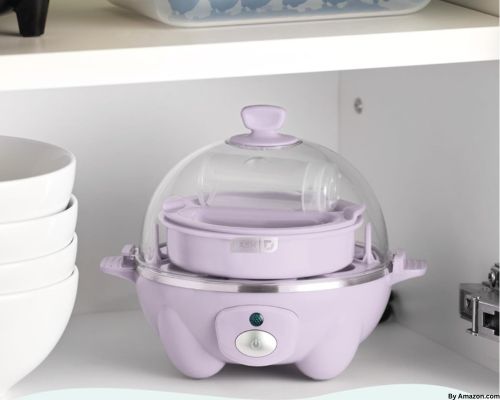
Convenience and Time-Saving
Boiling eggs on the stovetop may seem simple, but it requires precise timing and attention. Overcooked eggs can develop a greenish ring around the yolk, and undercooked eggs can ruin a meal.
A boiled egg maker automates this process. With the right water measurement and settings, you can achieve soft, medium, or hard-boiled eggs effortlessly. Some models even handle poached eggs and omelets, freeing up your time during busy mornings.
Consistent Results Every Time
One of the main advantages of an egg cooker is reliability. Traditional boiling can be unpredictable due to variations in stove heat, egg size, and freshness. Egg makers use steam and precise timing to produce uniform results, making meal prep much more predictable—especially helpful for families, meal preppers, and those who eat eggs regularly.
Multi-Functionality Beyond Boiled Eggs
Modern egg cookers often go beyond boiling. Many allow you to poach eggs, make omelets, or even prepare small portions for sandwiches and snacks. This versatility adds value to your kitchen and can replace multiple appliances, making it more than just a single-purpose gadget.
Space and Budget Considerations
If you rarely eat eggs or have limited kitchen space, a boiled egg maker may not be essential. Many units are compact and affordable, but they still occupy counter or cabinet space. Consider your cooking habits and how often you prepare eggs before investing.
| Top 6 Egg Cookers You’ll Love
6. Evoloop Rapid Egg Cooker Electric (6 Eggs)
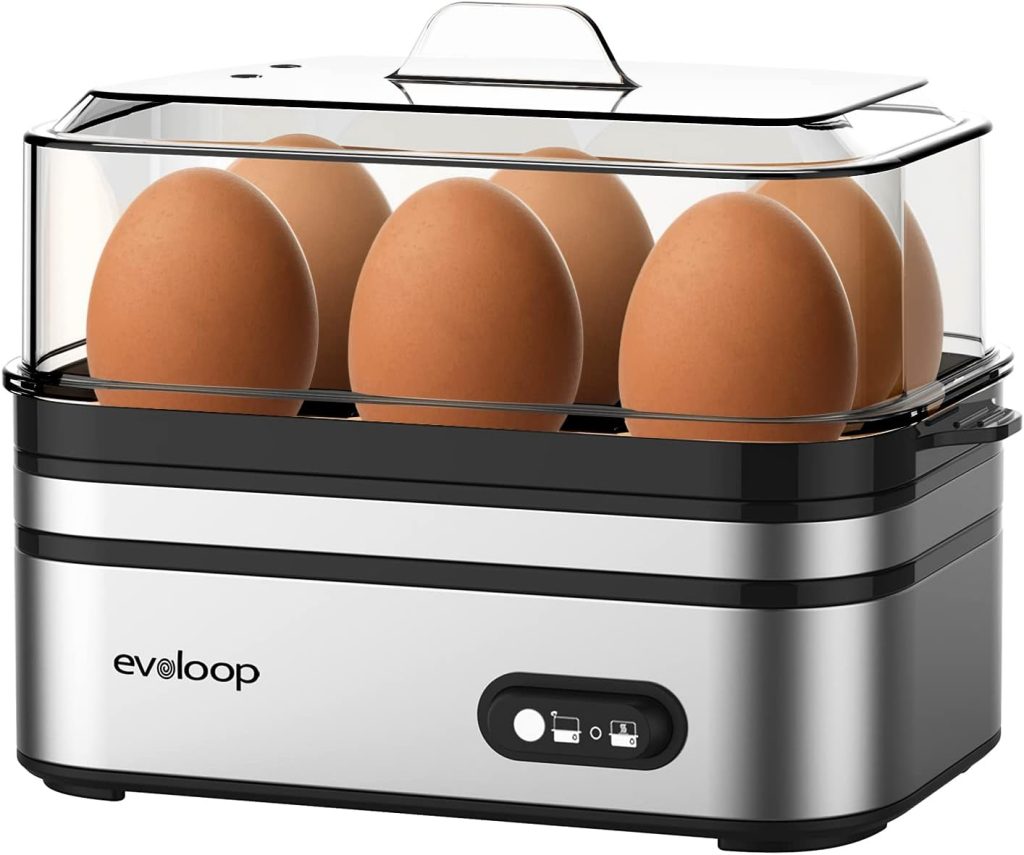
Compact efficiency for smaller households.
This Rapid Egg Cooker model is designed for cooking up to 6 eggs at a time, making it slightly smaller than some of the other options. It delivers the same versatility, allowing you to choose between soft, medium, or hard-boiled results, as well as poaching and omelet making.
With an auto shut-off feature and BPA-free materials, it ensures both safety and convenience. Its compact size is perfect for individuals, couples, or anyone short on kitchen counter space.
- Pros: Compact, versatile (boiled, poached, omelet), quick cooking, auto shut-off, BPA-free.
- Cons: Small capacity, mostly plastic build, basic features, needs regular cleaning.
5. Nostalgia Retro Electric Egg Cooker (7-Egg)
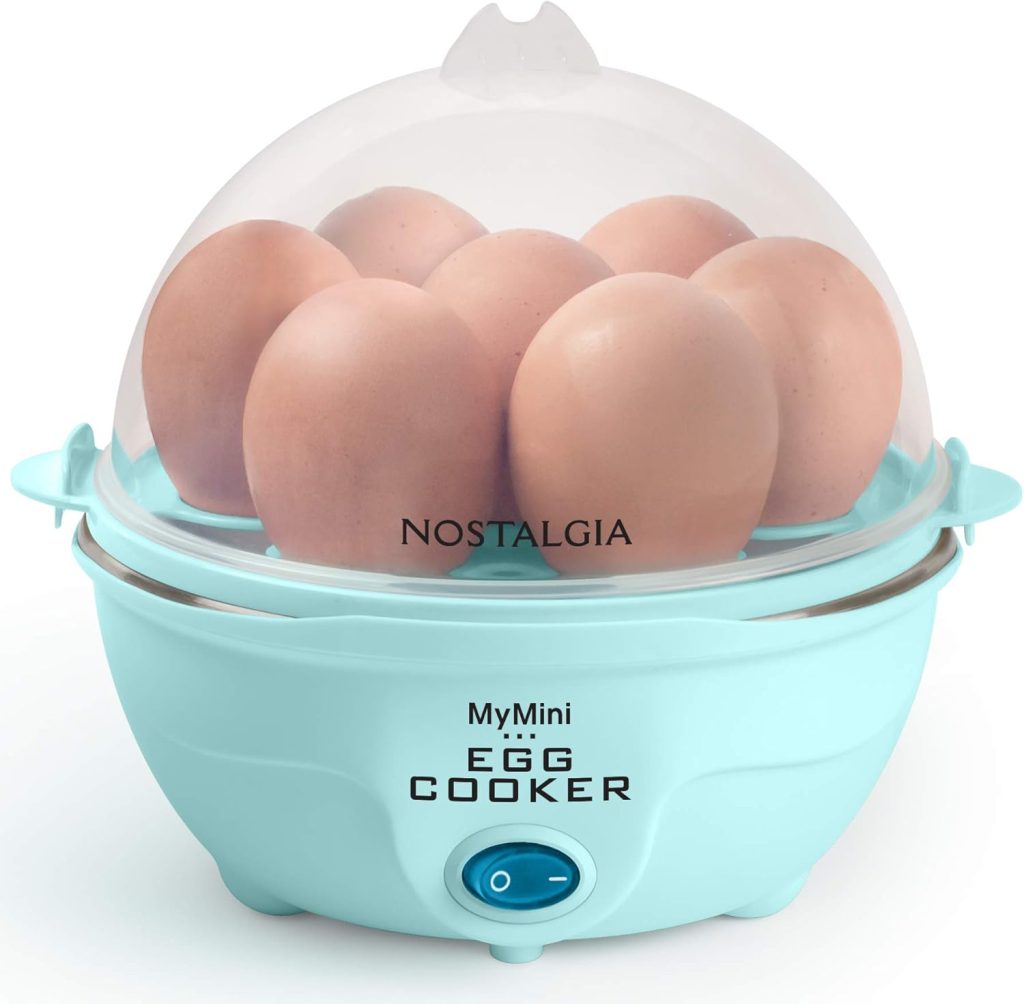
Retro design with modern functionality.
The Nostalgia Retro Egg Cooker stands out with its eye-catching aqua color and vintage-inspired design, making it as much a décor piece as a kitchen tool. With a 7-egg capacity, it can handle hard-boiled, soft-boiled, poached, or scrambled eggs with ease.
It also supports making omelets and even sandwich-ready egg portions, which makes it particularly appealing for those following keto or low-carb diets. Beyond its aesthetic charm, this model is reliable and straightforward, offering consistently good results while adding personality to your kitchen.
- Pros: Fast, consistent, affordable, attractive retro design.
- Cons: No dishwasher-safe parts, less precise water measuring.
4. Cuisinart CEC-10 (10-Egg, Stainless Steel)
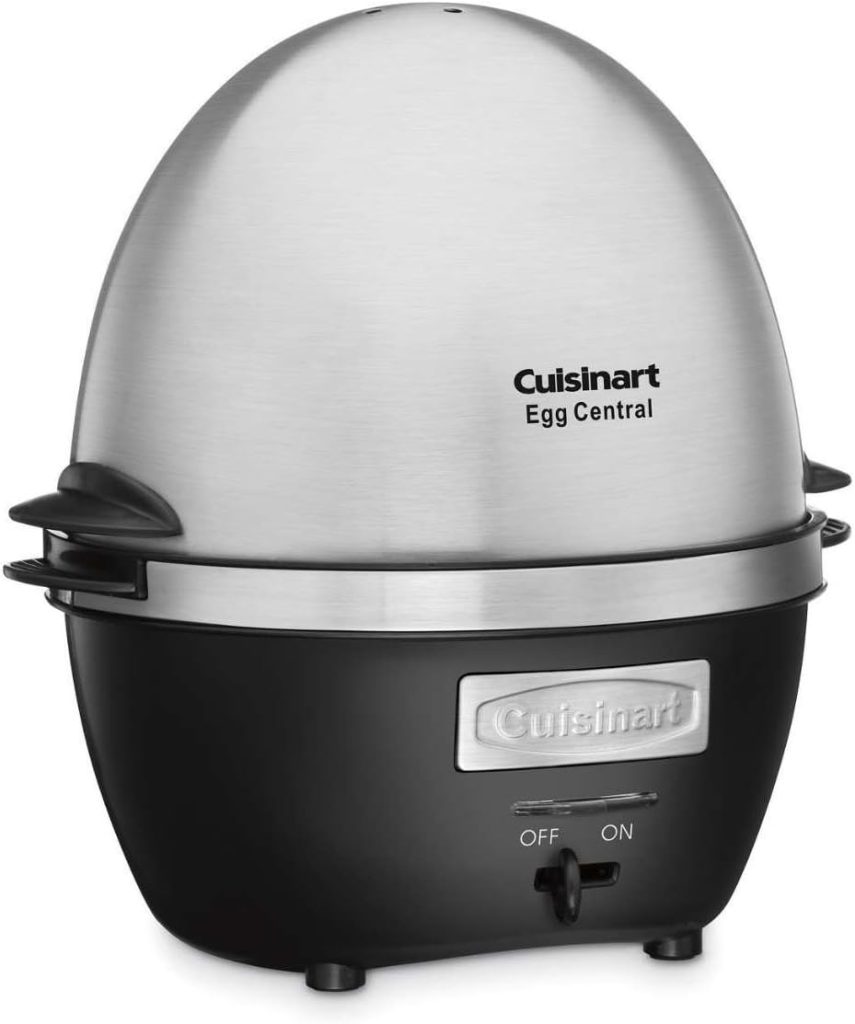
Premium construction meets practical cooking.
The Cuisinart CEC-10 is made with brushed stainless steel, giving it a modern and durable finish. Unlike most compact egg cookers, this one offers a generous 10-egg capacity, making it ideal for larger households or gatherings.
It also comes with two removable trays for poaching eggs and making omelets, adding extra versatility. The built-in cooking indicator alerts you when your eggs are ready, ensuring consistent results. If you’re looking for a high-quality egg cooker that balances capacity, durability, and reliability, the Cuisinart CEC-10 is an excellent choice.
- Pros: Large capacity, durable stainless steel, user-friendly, versatile.
- Cons: Measuring cup less stable, omelet tray smaller than expected.
3. BELLA Rapid Electric (7-Egg)
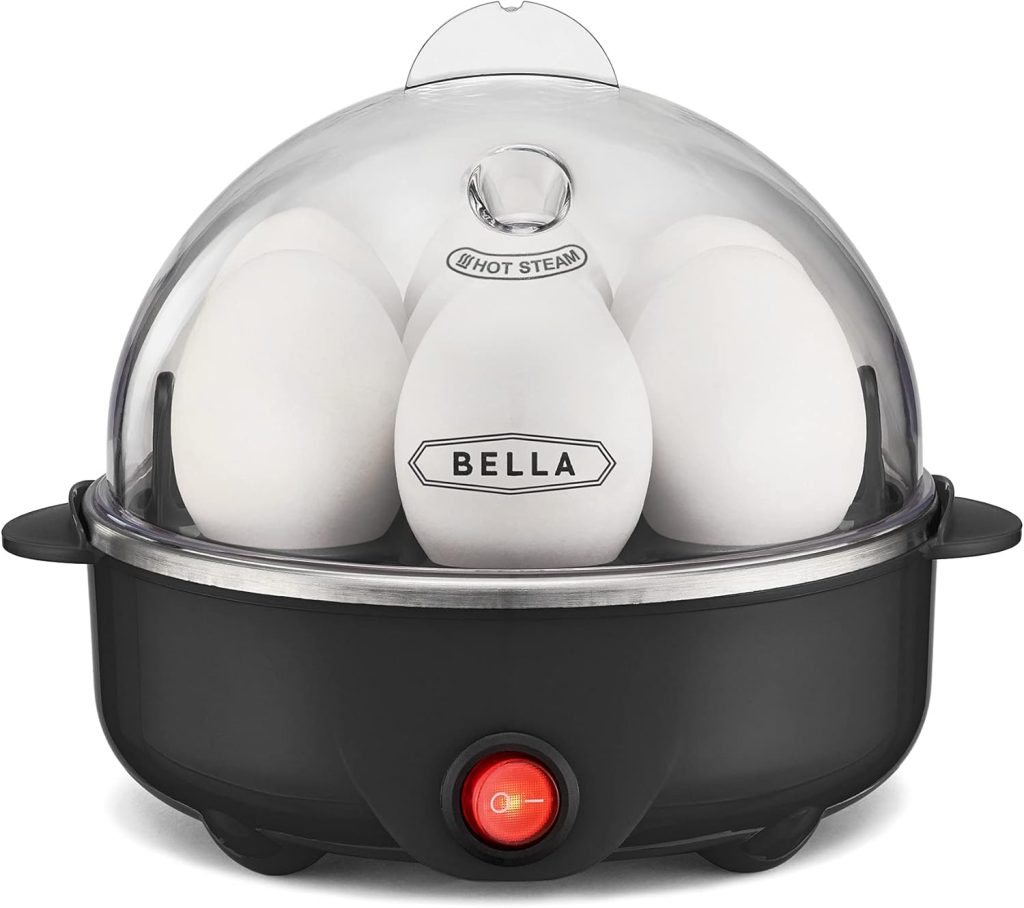
Smart cooking with stylish appeal.
The BELLA Rapid Electric Egg Cooker combines efficiency with design. Its 7-egg capacity tray lets you prepare a full batch in one go, whether you’re cooking for yourself or a small group. Like other leading options, it offers soft, medium, and hard-boiled cooking as well as poaching and omelet-making capabilities.
The automatic shut-off feature prevents overcooking, so you never have to worry about dried-out eggs. With a sleek black finish, this egg cooker not only works well but also adds a touch of elegance to your countertop.
- Pros: Stylish, versatile, auto shut-off.
- Cons: Similar limitations to Elite Gourmet (alarm, plastic build).
2. Elite Gourmet EGC-007B (7-Egg)
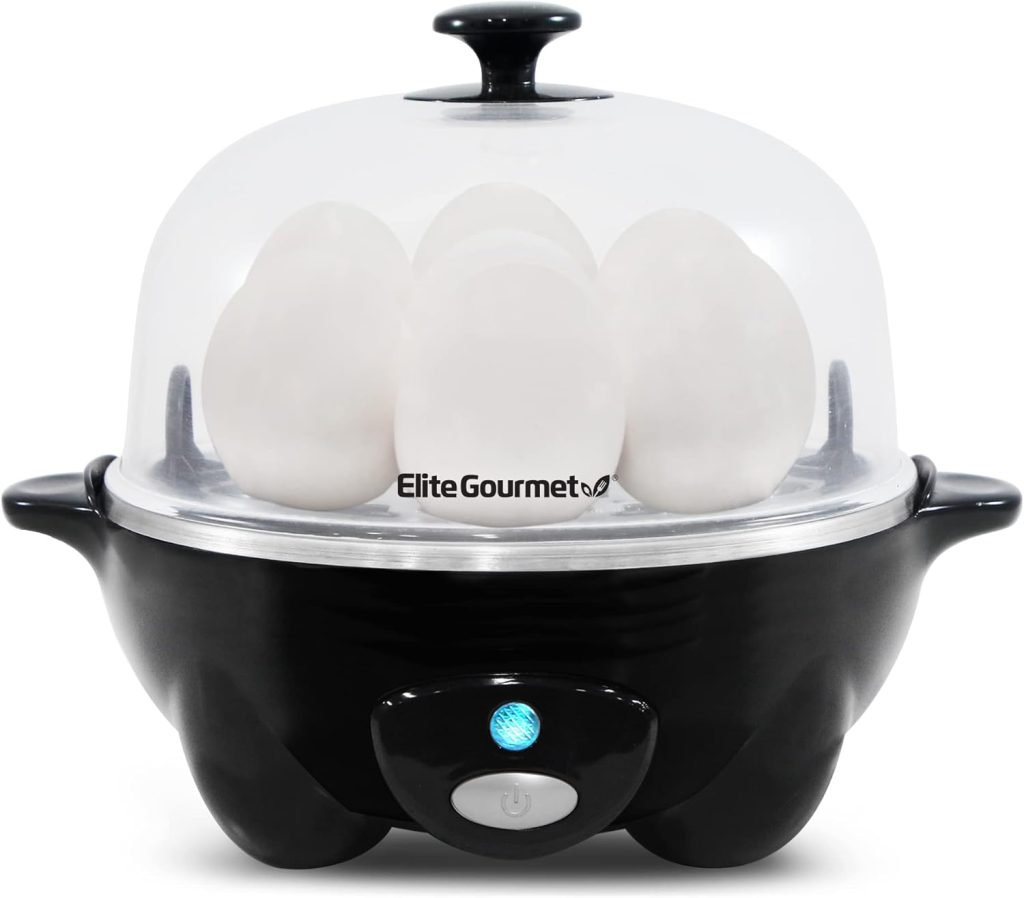
Reliable performance with a user-friendly design.
The Elite Gourmet EGC-007B can cook up to 7 eggs at once, making it a fantastic option for family breakfasts or weekly meal prep. It offers multiple cooking modes, including soft, medium, and hard-boiled, as well as poached eggs and omelets.
This model is especially known for producing easy-to-peel eggs, reducing frustration when preparing snacks or packed lunches. Equipped with an auto shut-off and alarm system, it guarantees safe and precise cooking. As a bonus, it comes with a 16-recipe booklet, giving users fresh ideas for incorporating eggs into their meals.
- Pros: Easy to use, consistent, includes trays & recipe booklet, compact.
- Cons: Loud alarm, only 2 poached eggs at once, plastic feels less durable.
1. Dash Rapid Egg Cooker (6-Egg)
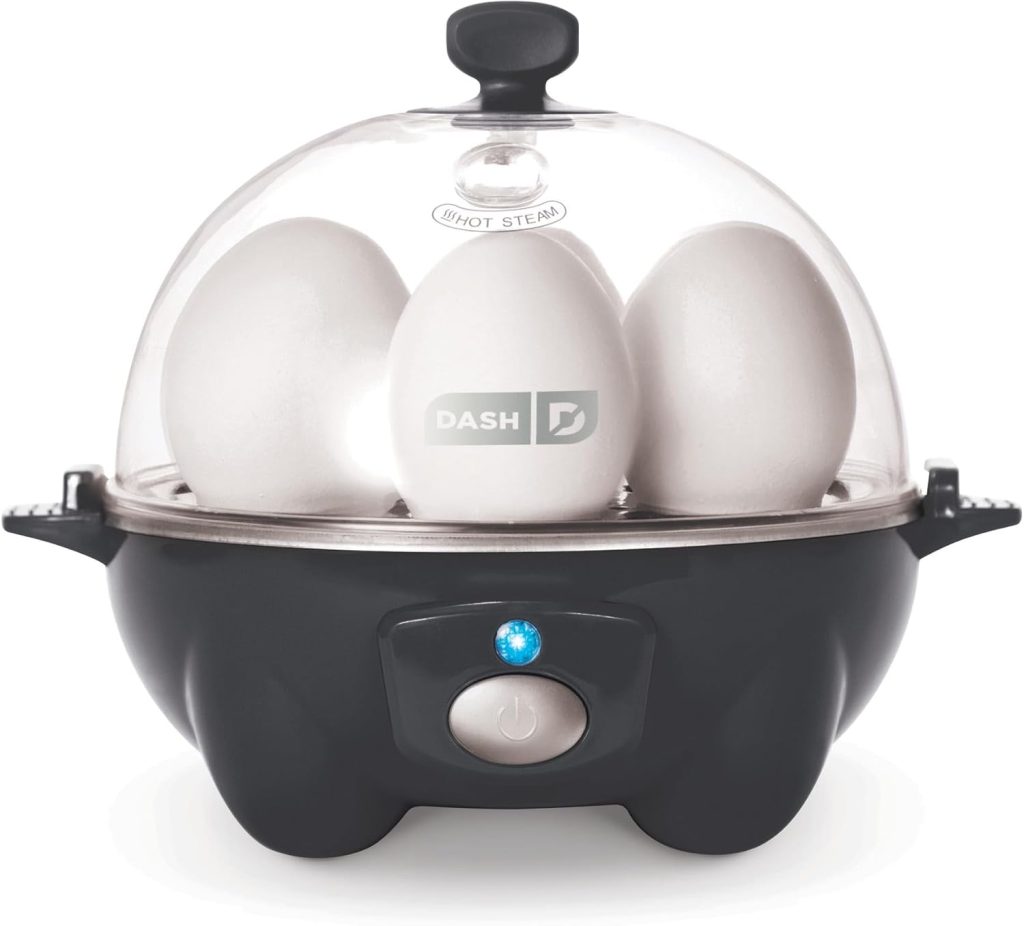
Compact convenience meets versatility.
The Rapid Egg Cooker is designed for busy households that need perfectly cooked eggs without the guesswork. With its straightforward design, this cooker allows you to prepare soft, medium, or hard-boiled eggs at the touch of a button.
It also works as a poacher and omelet maker, making it more versatile than traditional stovetop cooking. The built-in auto shut-off feature ensures safety and consistent results every time. Its BPA-free build makes it safe for daily use, and its small footprint makes it a perfect choice for apartments, dorms, or small kitchens.
- Pros: Affordable, compact, reliable results, easy to clean.
- Cons: Small capacity, requires water-level trial and error, poaching/omelet function less effective.
| How to Use Your Egg Cooker Properly and Keep It Lasting Longer
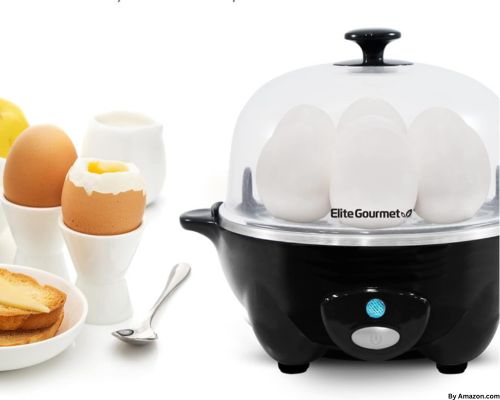
Understanding Your Boiled Egg Maker
Most egg cookers use steam to cook eggs. You add a specific amount of water to the heating plate, place your eggs in the tray, cover with the lid, and switch the machine on. Once the water evaporates, the cooker automatically shuts off or sounds an alarm, signaling that your eggs are done.
Getting familiar with your model’s trays (for poached eggs, omelets, or boiled eggs) and measuring cup markings is the first step to achieving great results.
Step-by-Step: How to Use a Boiled Egg Maker Correctly
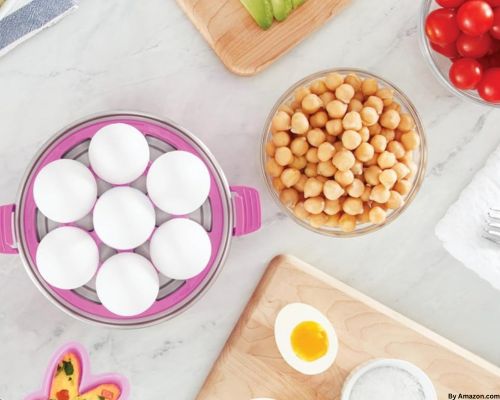
Measure Water Accurately
Each egg cooker comes with a measuring cup that indicates how much water to add for soft, medium, or hard-boiled eggs. Using the right water level is essential—too much water leads to overcooked eggs, while too little may leave them underdone.
Prepare the Eggs
Many egg cookers include a small pin or piercing tool on the bottom of the measuring cup. Puncturing the wide end of the eggshell before cooking allows steam to escape and prevents shells from cracking.
Load the Tray Properly
Place the eggs upright in the designated slots of the boiling tray. For poached eggs or omelets, use the special trays provided and lightly grease them with oil or butter to prevent sticking.
Start Cooking and Wait for the Alarm
Close the lid securely, press the start button, and let the machine do the work. Once the alarm sounds or the cooker shuts off, your eggs are ready. Remove them promptly to avoid overcooking from residual heat.
Cool and Serve
For boiled eggs, transfer them immediately into cold water. This stops cooking, makes peeling easier, and ensures the yolk retains its ideal texture.
Tips to Extend the Shelf Life of Your Egg Cooker
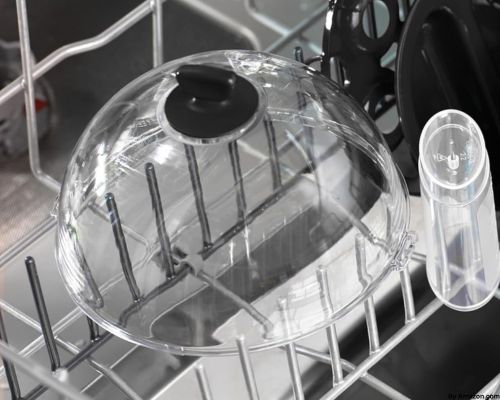
Clean After Every Use
Always unplug the unit and let it cool before cleaning. Wash the trays, lid, and measuring cup with warm soapy water. Wipe down the heating plate with a damp cloth—never submerge the base in water.
Prevent Limescale Buildup
Over time, mineral deposits from water can form on the heating plate. Descale it every few weeks by wiping with a mixture of vinegar and water. This not only improves performance but also extends the life of the appliance.
Store Properly
Keep all the accessories (trays, cup, lid) together in a dry place. Avoid storing the cooker in damp or humid areas, as this can damage electrical components.
Handle with Care
Egg cookers are lightweight but can be delicate. Avoid dropping or forcing the lid shut, and always handle trays gently to prevent cracks or warping.
Use as Intended
Stick to the manufacturer’s instructions. Overloading eggs, using harsh cleaning chemicals, or attempting recipes not suited for the device may shorten its lifespan.
| Common Egg Cooker Mistakes and How to Fix Them
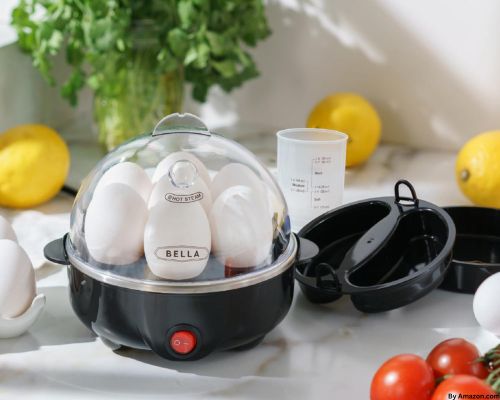
Mistake 1: Adding the Wrong Amount of Water
Problem:
Using too much water can lead to overcooked eggs, while too little leaves eggs underdone or causes the machine to stop too early.
Solution:
Always use the measuring cup provided with your egg cooker. Follow the markings for soft, medium, or hard-boiled eggs carefully. If your eggs consistently come out slightly over or under, adjust the water level by just a few drops until you find the perfect balance.
Mistake 2: Forgetting to Pierce the Eggs
Problem:
Eggs can crack during cooking because the steam inside builds pressure and has no release point.
Solution:
Use the pin or piercing tool (usually located on the measuring cup) to puncture the wide end of each egg before placing it in the tray. This simple step helps prevent cracking and makes peeling easier.
Mistake 3: Leaving Eggs Inside After the Alarm
Problem:
Even after the cooker shuts off, residual heat can continue cooking the eggs, leading to rubbery whites or chalky yolks.
Solution:
Remove the eggs immediately after the alarm sounds or the auto shut-off activates. For boiled eggs, place them in cold water right away to stop the cooking process and make peeling smoother.
Mistake 4: Skipping Regular Cleaning
Problem:
Egg residue, water stains, and mineral buildup on the heating plate can affect performance and even damage the appliance over time.
Solution:
After each use, wash the trays and lid with warm soapy water. Wipe the heating plate with a damp cloth. Every few weeks, clean the plate with a vinegar-and-water solution to remove limescale and keep the cooker heating efficiently.
Mistake 5: Overloading the Cooker
Problem:
Trying to cook more eggs than the stated capacity can lead to uneven cooking or cause the lid to not fit properly.
Solution:
Stick to the maximum egg capacity recommended by the manufacturer. If you need more eggs, cook them in batches. This ensures even cooking and prevents potential damage to the unit.
Mistake 6: Using Abrasive Cleaners or Submerging the Base
Problem:
Harsh cleaning tools can scratch the heating plate, and submerging the electrical base in water can cause permanent damage.
Solution:
Only clean the trays and lid with mild soap and water. For the base, wipe with a damp cloth—never immerse it in water. Avoid abrasive sponges or harsh chemicals.
Mistake 7: Ignoring Safety Features
Problem:
Some users leave the cooker unattended for too long or restart it immediately after one cycle, which can overheat the appliance.
Solution:
Allow the egg cooker to cool between uses, and never bypass the auto shut-off system. These safety features are designed to protect both the machine and the user.
| Boiled Egg Maker FAQs: Everything You Need to Know
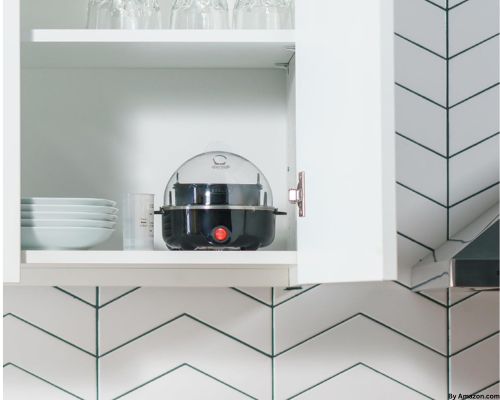
Q1. Do I really need a boiled egg maker?
A. Not everyone needs one, but if you eat eggs regularly, a boiled egg maker can save you time and effort. It eliminates guesswork, provides consistent results, and is especially useful for families, students, or meal preppers.
Q2. How many eggs can I cook at once?
A. This depends on the model. Smaller units typically hold 6 eggs, while larger ones can handle up to 10 or 12. Always check your appliance’s maximum capacity and avoid overloading for best results.
Q3. Why do I need to pierce the eggs before cooking?
A. Piercing the wide end of the eggshell allows steam to escape during cooking. Without it, eggs may crack or burst. It also makes peeling easier.
Q4. Are egg cookers only for boiled eggs?
A. No. Most egg cookers include trays for poaching eggs, making omelets, or steaming vegetables. Some even allow you to prepare scrambled eggs or sandwich-ready portions.
Q5. How do I clean a boiled egg maker?
A. Wash the trays, lid, and measuring cup with warm, soapy water. Wipe down the heating plate with a damp cloth after it cools. Never submerge the base in water. For long-term maintenance, remove mineral buildup with a vinegar-and-water solution every few weeks.
Q6. Why are my eggs hard to peel even with an egg cooker?
A. This often depends on the freshness of the eggs. Fresher eggs are harder to peel, while slightly older eggs peel more easily. Cooling eggs immediately in cold water after cooking also helps.
Q7. Can I use tap water in my egg cooker?
A. Yes, but if your tap water is hard (high in minerals), limescale may build up faster on the heating plate. Using filtered or distilled water can reduce this issue and extend the life of your cooker.
Q8. Are boiled egg makers safe to use?
A. Yes, most models come with auto shut-off and alarms to prevent overheating. As long as you use them according to the manufacturer’s instructions, they are very safe.
Q9. How long do boiled egg makers last?
A. With proper use and maintenance—regular cleaning, descaling, and safe handling—an egg cooker can last several years. Compact plastic models may wear faster, while stainless-steel models tend to be more durable.
Q10. Can I cook other foods in an egg cooker?
A. Some models allow you to steam small portions of vegetables or dumplings. However, always check your instruction manual before experimenting, since not all cookers are designed for multi-purpose use.
| Closing Text

Choosing the right boiled egg maker can make meal preparation faster, healthier, and stress-free. Whether you need a small model for quick breakfasts or a larger unit for family cooking, the options are versatile and reliable.
With proper usage, cleaning, and care, your egg cooker can last for years while delivering perfectly cooked eggs every time. If you’re ready to simplify your kitchen routine, investing in the right egg cooker is a decision you won’t regret.

